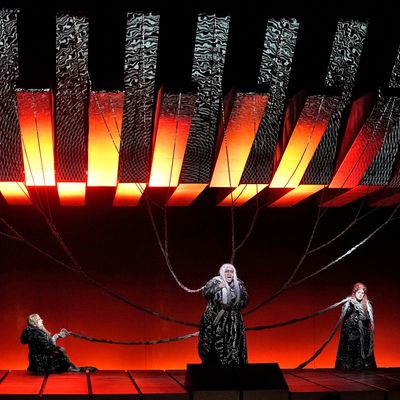
With any luck (not that we deserve it), when the asteroid hits or the oceans rise or humanity chokes on its own stupidity, we’ll go out to the luminous last pages of Wagner’s Götterdämmerung. All those sparkling undulations and levitating melodies could go a long way to soothing extinction. He got it right, the insufferable megalomaniac: The end won’t come as a surprise; we’ll see it coming from four operas away. But, like Wagner’s gods and low-IQ heroes, his Wälsungen and Nibelungen and incestuous siblings, we’ll all blunder toward it anyway, quarreling right up until the final curtain over who gets a trinket or who slept with whom.
The Metropolitan Opera is wrapping up its Ring cycle, which is an unhelpful bit of news if you didn’t buy tickets a year ago. If you forgot, it may console you to know that Robert Lepage’s 2012 production still ends in a cloud of smoke and disappointment. His famous machine, with its slow-whirling steel slats and copious projections, still creaks and moans like an old warrior’s bones first thing in the morning. More important, it still looks like a bunch of steel slats. You will, on the other hand, be sorry to have missed the conductor Philippe Jordan, who had the orchestra execute the final episode’s five-hour score as if in a single liquid stroke; Andreas Schager’s jovial debut as Siegfried, whom he sang as a large-lunged lunk with a brassy tenor; Eric Owens’s grandly malignant Hagen; or Edith Haller’s startlingly vivid Gutrune.
But the main takeaway is that if you ever have another chance to catch Christine Goerke singing Brünnhilde, you should pawn the family puppy for a ticket, if that’s what it takes. I’ve already reported on her tour de force in Die Walküre, and in Götterdämmerung her interpretation grows even more humane and multilayered. The character makes her first appearance two operas earlier as a Wotan’s action-hero daughter (winged horse, breastplate), and begins the last one as a mortal in love. She never makes her peace with that demotion, but the soprano lets the character share her own wry sense of humor, and twists together ferocity and tenderness. There’s a passage, right at the end, when the widowed Brünnhilde briefly rediscovers her Valkyrie superpowers, and when Goerke juices her voice with electrifying glee, there is no more thrilling moment in opera.
Götterdämmerung, closing out the Metropolitan Opera’s Ring Cycle, will be performed again on May 4 and May 11.





